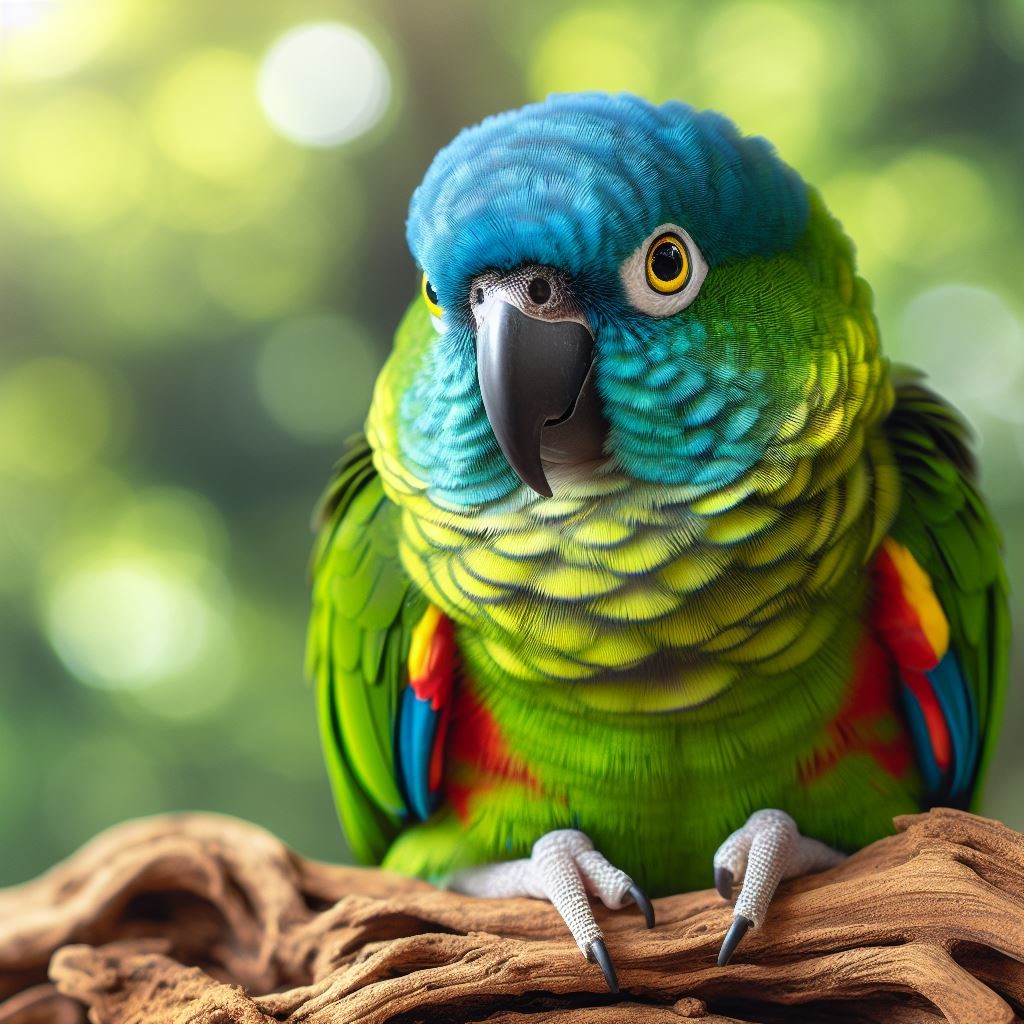The Blue Crowned Conure, with its vibrant colors and charming personality, is a popular choice among bird enthusiasts. This medium-sized parrot is known for its playful nature and sociable demeanor, making it a delightful addition to any home. In this article, we will explore the world of the Blue Crowned Conure, covering everything from its appearance and behavior to its diet and care requirements.

Appearance and Characteristics
The Blue Crowned Conure is named for the striking blue feathers on its head, which contrast beautifully with its green body. It has a long tail and a stout, curved beak that is perfect for cracking open seeds. These birds are known for their playful antics and vocalizations, which include chirps, squawks, and even mimicry of human speech. Blue Crowned Conures are intelligent birds and can learn to perform tricks and solve puzzles.
Habitat and Natural Behavior
In the wild, Blue Crowned Conures are found in parts of South America, where they inhabit forests and woodlands. They are social birds and are often seen in flocks, engaging in activities such as foraging for food and preening each other’s feathers. In captivity, it is important to provide them with plenty of social interaction and mental stimulation to prevent boredom and behavioral issues.
Diet and Feeding Habits
Blue Crowned Conures are omnivores, meaning they eat a variety of foods including fruits, vegetables, seeds, and insects. In captivity, it is important to provide them with a balanced diet that includes a mix of commercial parrot pellets, fresh fruits and vegetables, and the occasional treat such as nuts or dried fruit. Fresh water should always be available.
Lifespan and Health
With proper care, Blue Crowned Conures can live up to 30 years or more in captivity. Like all birds, they are prone to certain health issues such as feather plucking, beak malformations, and respiratory infections. Regular check-ups with an avian veterinarian are recommended to ensure they remain healthy.
Social Behavior and Interaction with Humans
Blue Crowned Conures are known for their sociable nature and enjoy interacting with their human caregivers. They can form strong bonds with their owners and often enjoy being petted and cuddled. However, they can also be quite loud and demanding at times, so it is important to provide them with plenty of attention and mental stimulation.
Training and Enrichment
Training a Blue Crowned Conure can be a fun and rewarding experience. These birds are intelligent and can learn to perform a variety of tricks and behaviors. Positive reinforcement techniques, such as using treats and praise, are effective in training them. Providing them with plenty of toys and enrichment activities is also important to keep them mentally stimulated.
Housing and Cage Requirements
Blue Crowned Conures are active birds and require a spacious cage to move around and exercise. The cage should be large enough to accommodate their wingspan and should be equipped with perches, toys, and feeding dishes. It is also important to provide them with plenty of out-of-cage time to stretch their wings and interact with their environment.
Breeding and Reproduction
Breeding Blue Crowned Conures should only be undertaken by experienced breeders. These birds require specific conditions, such as a suitable nesting site and a proper diet, to successfully raise chicks. It is important to research and understand the breeding process thoroughly before attempting to breed these birds.
Conclusion
The Blue Crowned Conure is a beautiful and intelligent bird that makes a wonderful companion for those willing to dedicate the time and effort to care for them properly. With their striking appearance and charming personality, these birds are sure to bring joy and laughter to any home.
FAQs
- Are Blue Crowned Conures noisy? Yes, Blue Crowned Conures can be noisy, especially during the morning and evening when they are most active. Providing them with plenty of toys and mental stimulation can help reduce excessive noise.
- Do blue-crowned conures require a lot of attention? Yes, Blue Crowned Conures are social birds that require a lot of attention and interaction from their human caregivers. They enjoy being part of the family and thrive on companionship.
- Can Blue Crowned Conures talk? Yes, Blue Crowned Conures are capable of learning to mimic human speech. However, not all birds will learn to talk, and those that do may only learn a few words or phrases.
- How big do Blue Crowned Conures get? Blue Crowned Conures are medium-sized parrots, typically measuring between 13 to 14 inches in length from beak to tail.
- Do Blue Crowned Conures make good pets for beginners? While Blue Crowned Conures are relatively easy to care for compared to some other parrot species, they require a significant amount of time, attention, and space. They may not be the best choice for beginners who are not prepared for the commitment involved in caring for them.






